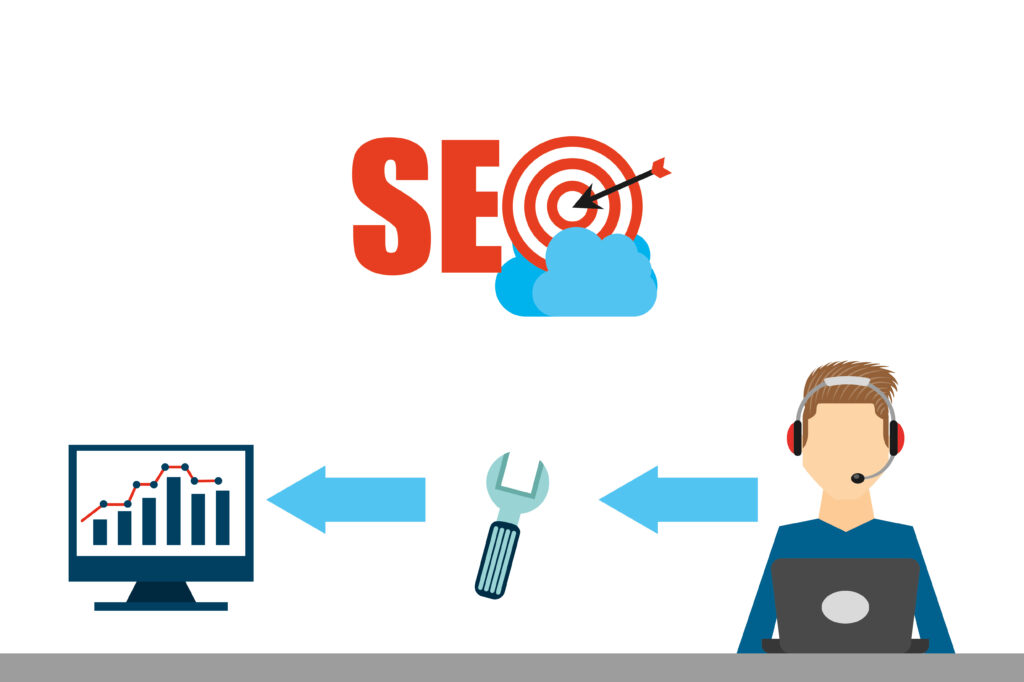
Local SEO for small businesses is a game-changer. It’s the key to unlocking visibility, attracting customers, and growing your business in your local area. But what exactly is local SEO? How can it benefit your small business? Let’s dive in and explore this powerful marketing strategy.
Table of Contents
Introduction to Local SEO for Small Businesses
What is Local SEO?
Local SEO is a specialized form of search engine optimization. It focuses on improving a business’s visibility in local search results. Think of it as the digital equivalent of a local business directory. But it’s much more powerful and far-reaching.
Local SEO targets searches with local intent. These are queries like “pizza near me” or “dentist in [city name]”. It’s all about connecting local businesses with local customers. And it’s becoming increasingly important in today’s digital landscape.
Why Local SEO Matters for Small Businesses
For small businesses, local SEO is not just important—it’s essential. Here’s why:
- Most consumers use search engines to find local businesses.
- Local searches often lead to quick purchases.
- It levels the playing field, allowing small businesses to compete with larger chains.
- It’s cost-effective, offering a high return on investment.
Local SEO helps you reach customers when they’re actively looking for your products or services. It’s targeted, efficient, and incredibly effective.
The Impact of Local SEO on Small Business Success
Local SEO can dramatically transform your small business. Let’s explore its key benefits.
1. Increased Visibility in Local Search Results
Visibility is crucial in the digital age. Local SEO puts your business on the map—literally. It helps you appear in Google’s Local Pack, Maps results, and organic search listings.
When someone searches for your services locally, you want to be there. Local SEO makes that happen. It increases your chances of being seen by potential customers.
2. Building Credibility and Trust with Local Customers
Trust is the foundation of any successful business. Local SEO helps build that trust. How? By showcasing your business information, customer reviews, and local relevance.
When customers see your business consistently across different platforms, it builds credibility. They’re more likely to choose you over competitors they know less about.
3. Driving Targeted Traffic and Boosting Conversions
Traffic is good. Targeted traffic is better. Local SEO drives highly relevant traffic to your website or physical store. These are people actively looking for what you offer.
This targeted approach leads to higher conversion rates. People finding you through local searches are more likely to become customers. They’re already interested in your products or services.
4. Cost-Effective Marketing Solutions for Limited Budgets
Small businesses often have tight marketing budgets. Local SEO offers a cost-effective solution. It doesn’t require a large upfront investment like traditional advertising.
With local SEO, you can compete effectively with larger businesses without breaking the bank. It’s about smart strategies, not deep pockets.
5. Gaining a Competitive Edge in Your Local Market
In today’s competitive market, standing out is crucial. Local SEO gives you that edge. It helps you differentiate your business and showcase your unique value proposition.
By optimizing for local search, you’re positioning your business as a local authority. This can set you apart from competitors who aren’t leveraging local SEO effectively.
Essential Local SEO Strategies for Small Businesses
Now that we understand the importance of local SEO, let’s dive into key strategies.
1. Optimizing Google Business Profile (formerly Google My Business)
Your Google Business Profile is your digital storefront. It’s often the first thing potential customers see. Optimizing it is crucial for local SEO success.
Here’s how to make the most of your profile:
- Claim and verify your listing.
- Provide accurate and complete information.
- Add high-quality photos and videos.
- Respond to customer reviews promptly.
- Post updates and offers regularly.
A well-optimized Google Business Profile can significantly boost your local visibility.
2. Building and Managing Local Citations
Local citations are mentions of your business name, address, and phone number (NAP) online. They play a crucial role in local SEO.
Consistent citations across the web signal credibility to search engines. They help verify your business information and improve your local search rankings.
Focus on getting citations from reputable local directories, industry-specific websites, and social media platforms. Quality matters more than quantity.
3. Generating and Responding to Customer Reviews
Reviews are the lifeblood of local businesses. They influence customer decisions and impact your local search rankings.
Encourage satisfied customers to leave reviews. Make it easy for them. Respond to all reviews, both positive and negative. This shows you value customer feedback and are actively engaged with your community.
4. Creating Locally-Relevant Content
Content is king in SEO, and local SEO is no exception. Create content that resonates with your local audience. This could include:
- Blog posts about local events or news
- Guides to local attractions
- Information about local laws or regulations related to your industry
- Customer success stories from local clients
Locally-relevant content helps establish your business as a community authority. It also provides opportunities to naturally incorporate local keywords.
4. Implementing Local Keywords in On-Page SEO
Keywords are the foundation of SEO. For local SEO, focus on localized keywords. These are phrases that include your city, neighborhood, or region.
Incorporate these keywords naturally into your:
- Page titles and meta descriptions
- Header tags (H1, H2, etc.)
- URL structures
- Image alt text
- Content body
Remember, natural usage is key. Don’t force keywords where they don’t fit.
5. Leveraging Social Media for Local Engagement
Social media is a powerful tool for local engagement. It allows you to connect with your community and showcase your local presence.
Use social media to:
- Share local news and events
- Highlight customer success stories
- Showcase your involvement in community activities
- Promote local partnerships or collaborations
Social signals can indirectly impact your local SEO performance. They help build brand awareness and drive traffic to your website.
Advanced Local SEO Techniques
Ready to take your local SEO to the next level? Let’s explore some advanced techniques.
1. Implementing Schema Markup for Local Businesses
Schema markup is a code that helps search engines understand your website content better. For local businesses, it’s particularly valuable.
Local business schema can highlight key information like:
- Business name, address, and phone number
- Business hours
- Accepted payment methods
- Customer reviews
Implementing schema markup can improve your search appearance and potentially boost your rankings.
2. Creating Location-Specific Landing Pages
If your business serves multiple locations, consider creating dedicated landing pages for each. These pages should include:
- Location-specific content
- Local keywords
- Information about services specific to that location
- Local customer testimonials
Location pages help you rank for location-specific searches. They also provide a better user experience for local customers.
3. Optimizing for Voice Search and Local Queries
Voice search is on the rise, especially for local queries. Optimize for voice search by:
- Using natural language in your content
- Answering common questions directly
- Optimizing for long-tail keywords and phrases
Remember, voice searches often have local intent. “Where’s the nearest coffee shop?” is a common voice query.
4. Utilizing Local Link Building Strategies
Link building is crucial for SEO, including local SEO. Focus on getting high-quality local backlinks. These could come from:
- Local business associations
- Community organizations
- Local news websites
- Partner businesses
Local links signal to search engines that your business is an established part of the community.
5. Embracing Hyperlocal Marketing Approaches
Hyperlocal marketing takes local SEO a step further. It focuses on extremely specific geographic areas, sometimes down to a few blocks.
Strategies might include:
- Targeting neighborhood-specific keywords
- Creating content about hyper-local events or news
- Partnering with other businesses in your immediate area
Hyperlocal marketing can help you dominate in very specific local markets.
Mobile Optimization for Local SEO
In today’s mobile-first world, mobile optimization is crucial for local SEO success.
The Importance of Mobile-Friendly Websites
Most local searches happen on mobile devices. If your website isn’t mobile-friendly, you’re missing out on potential customers.
Ensure your website is responsive and loads quickly on mobile devices. Google’s mobile-first indexing means your mobile site is now your primary site in the eyes of search engines.
Optimizing for Local “Near Me” Searches
“Near me” searches have exploded in popularity. These are highly valuable for local businesses.
To optimize for “near me” searches:
- Ensure your Google Business Profile is up-to-date
- Use location-based keywords in your content
- Implement local business schema markup
- Encourage check-ins and location-based reviews
Remember, “near me” searches often have high purchase intent.
Leveraging Location-Based Services and Apps
Location-based services and apps can boost your local visibility. Consider platforms like:
- Yelp
- Foursquare
- TripAdvisor
- Industry-specific apps
Claim your listings on these platforms. Keep your information up-to-date and engage with users.
Measuring and Improving Local SEO Performance

Like any marketing strategy, local SEO requires ongoing measurement and optimization.
Key Metrics for Tracking Local SEO Success
Track these key metrics to gauge your local SEO performance:
- Local search rankings
- Google Business Profile views and actions
- Local organic traffic
- Local conversion rates
- Review quantity and quality
These metrics will give you a comprehensive view of your local SEO success.
Tools for Monitoring Local Search Rankings
Several tools can help you monitor your local search performance. Some popular options include:
- Google Search Console
- Grexa AI
- SEMrush
- Moz Local
- BrightLocal
These tools provide valuable insights into your local search visibility and performance.
Analyzing Local Search Traffic and Conversions
Don’t just track traffic—analyze it. Look at:
- Where your local traffic is coming from
- Which pages are performing best for local searches
- How local traffic converts compared to non-local traffic
This analysis will help you identify opportunities for improvement.
Continuous Improvement Strategies for Local SEO
Local SEO isn’t a “set it and forget it” strategy. It requires ongoing effort. Here are some continuous improvement strategies:
- Regularly update your Google Business Profile
- Consistently generate new reviews
- Create fresh, locally-relevant content
- Stay updated on local SEO best practices and algorithm changes
Remember, local SEO is an ongoing process, not a one-time task.
Navigating Local SEO Challenges for Small Businesses
Local SEO comes with its own set of challenges. Let’s explore some common ones and how to overcome them.
Competing with Larger Brands in Local Search
Competing with big brands can be daunting. But local SEO levels the playing field. Focus on:
- Highlighting your local expertise
- Providing exceptional customer service
- Creating highly localized content
- Building strong relationships with your community
Your local focus can be your biggest advantage against larger competitors.
Managing Multiple Locations in Local SEO
For businesses with multiple locations, local SEO can be complex. Key strategies include:
- Creating individual location pages
- Managing separate Google Business Profiles for each location
- Ensuring consistent NAP information across all locations
- Developing location-specific content and campaigns
Proper management of multiple locations can significantly boost your overall local SEO performance.
Adapting to Algorithm Updates and Industry Changes
The SEO landscape is always changing. Stay informed about:
- Google algorithm updates
- Changes in local search trends
- New features in Google Business Profile
- Emerging local SEO best practices
Flexibility and adaptability are key to long-term local SEO success.

The Future of Local SEO for Small Businesses
Local SEO is evolving rapidly. Let’s look at some trends shaping its future.
1. Emerging Technologies in Local Search
New technologies are transforming local search. Keep an eye on:
- Artificial Intelligence and machine learning
- Augmented Reality in Local Marketing
- Voice search optimization
- Local video content
Staying ahead of these trends can give you a competitive edge.
2. Preparing for AI and Machine Learning in Local SEO
AI and machine learning are already impacting local search. They’re making search results more personalized and context-aware.
To prepare:
- Focus on user intent, not just keywords
- Create high-quality, relevant content
- Optimize for conversational queries
- Provide comprehensive, accurate business information
The future of local SEO will be increasingly driven by AI and machine learning.
3. Integrating Augmented Reality in Local Marketing
Augmented Reality (AR) is opening new possibilities for local marketing. Consider:
- Virtual store tours
- AR-enhanced product demonstrations
- Location-based AR experiences
While still emerging, AR could revolutionize how customers interact with local businesses.
Case Studies: Small Businesses Succeeding with Local SEO
Let’s look at some real-world examples of local SEO success.
Case 1: Retail Store Boosts Foot Traffic with Local SEO
A small boutique clothing store implemented a comprehensive local SEO strategy. They optimized their Google Business Profile, encouraged customer reviews, and created locally relevant content.
The result? A 150% increase in website traffic from local searches and a 75% boost in foot traffic to their physical store.
Case 2: Service-Based Business Expands Customer Base
A local plumbing company focused on building local citations and optimizing for “near me” searches. They also created location-specific landing pages for each neighborhood they served.
Within six months, they saw a 200% increase in local organic traffic and a 50% increase in service calls from new customers.
Case 3: Restaurant Increases Online Orders Through Local Search
A family-owned restaurant invested in local SEO. They optimized their website for local keywords, encouraged customer reviews, and regularly updated their Google Business Profile with new menu items and photos.
The result was a 300% increase in online orders and a 50% boost in reservations from local searches.
Conclusion: Empowering Small Businesses with Local SEO
Local SEO is a powerful tool for small businesses. It levels the playing field, allowing you to compete with larger competitors. It connects you with local customers when they’re actively searching for your products or services.
Recap of Key Strategies and Benefits
Remember these key strategies:
- Optimize your Google Business Profile
- Build and manage local citations
- Generate and respond to customer reviews
- Create locally-relevant content
- Implement local keywords in your on-page SEO
- Leverage social media for local engagement
The benefits are clear: increased visibility, improved credibility, targeted traffic, and higher conversions.
Action Steps for Implementing Local SEO
Ready to get started? Here are your next steps:
- Claim and optimize your Google Business Profile
- Conduct local keyword research
- Audit your website for local SEO opportunities
- Develop a strategy for generating customer reviews
- Create a content plan focused on local topics
Remember, local SEO is an ongoing process. Consistency and persistence are key.
Resources for Ongoing Local SEO Learning and Support
Stay updated with these resources:
- Google’s official guidelines for representing your business
- Local SEO blogs and forums
- Local SEO tools and platforms
- Professional SEO communities and networks
Consider partnering with a local SEO expert or agency for ongoing support and optimization.
Local SEO is your ticket to local business success. It’s time to put your business on the map—literally and figuratively. Start implementing these strategies today, and watch your local visibility and customer base grow.
FAQ
What’s the difference between regular SEO and local SEO?
Regular SEO focuses on improving website visibility in national or global search results. Local SEO specifically targets local search results and aims to improve visibility for location-based queries.
How long does it take to see results from local SEO efforts?
Results can vary, but many businesses start seeing improvements within 3-6 months. Significant results often take 6-12 months of consistent effort.
Is local SEO only important for businesses with physical locations?
While local SEO is crucial for businesses with physical locations, it’s also important for service-area businesses that serve specific geographic regions.
How often should I update my Google Business Profile?
It’s best to keep your Google Business Profile updated regularly. Post updates at least weekly, respond to reviews promptly and ensure your business information is always accurate.